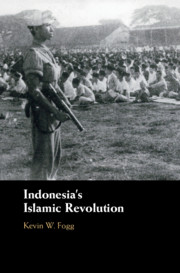Book contents
- Indonesia’s Islamic Revolution
- Indonesia’s Islamic Revolution
- Copyright page
- Contents
- Acknowledgments
- A Note on Indonesian Names
- Map
- Introduction
- 1 Islam in Indonesia before the Revolution
- Part I Islam in Indonesia’s War of Independence
- 2 Islamic Calls to Action
- 3 Ulama, Islamic Organizations, and Islamic Militias
- 4 Magic, Amulets, and Trances
- 5 Social Revolution
- 6 Darul Islam
- Part II Islam in Indonesia’s Political Revolution
- Conclusion
- Appendix: Oral History Sources
- Glossary
- Bibliography
- Index
4 - Magic, Amulets, and Trances
from Part I - Islam in Indonesia’s War of Independence
Published online by Cambridge University Press: 18 November 2019
- Indonesia’s Islamic Revolution
- Indonesia’s Islamic Revolution
- Copyright page
- Contents
- Acknowledgments
- A Note on Indonesian Names
- Map
- Introduction
- 1 Islam in Indonesia before the Revolution
- Part I Islam in Indonesia’s War of Independence
- 2 Islamic Calls to Action
- 3 Ulama, Islamic Organizations, and Islamic Militias
- 4 Magic, Amulets, and Trances
- 5 Social Revolution
- 6 Darul Islam
- Part II Islam in Indonesia’s Political Revolution
- Conclusion
- Appendix: Oral History Sources
- Glossary
- Bibliography
- Index
Summary
Syekh Buya Ungku Saliah, usually called Tuanku Saliah, was a key religious leader near Lubuk Alung, West Sumatra. He was well known in the region for being particularly harsh on moral laxity, for leading a branch of the Shattariyah Sufi brotherhood, and for his ability in making and undoing magic. A particular specialty was using Qur’anic verses to break pakasiah, spells that made women fall in love with someone in particular, or kabaji, spells to create hatred between husband and wife. During the Indonesian revolution, Tuanku Saliah was already elderly, in his sixties, so he did not participate in the fighting directly. He did, however, play a key role in protecting Lubuk Alung. One market day, when the market was full of vendors, traders, and customers doing their business for the week, Tuanku Saliah had a vision and told everyone to clear out before heavy rain. This was unusual, considering it was not the rainy season, but people cleared the market anyhow in deference to this stern religious leader. No more than two hours later, the Dutch conducted an air assault on Lubuk Alung and leveled the market.1
- Type
- Chapter
- Information
- Indonesia's Islamic Revolution , pp. 79 - 93Publisher: Cambridge University PressPrint publication year: 2019

